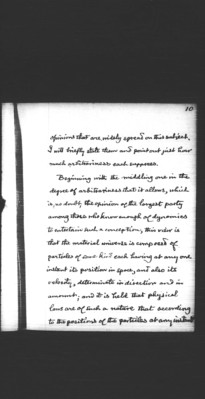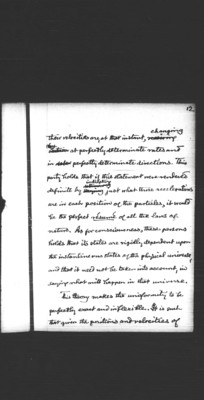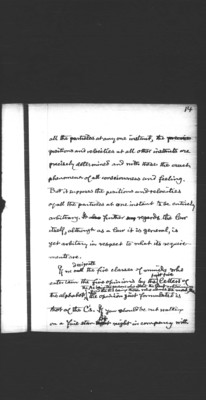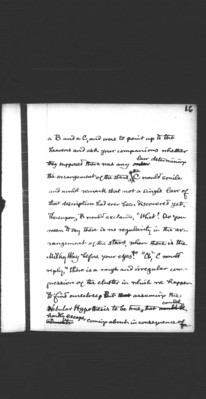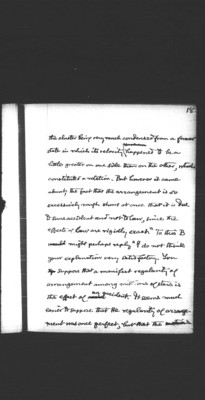Pages
6
10
opinions that are widely spread on this subject. I will briefly state them and point out just how much arbitrariness each supposes.
Beginning with the middling one in the degree of arbitrariness that it allows, which is, no doubt, the opinion of the largest party among those who know enough of dynamics to entertain such a conception, this view is that the material universe is composed of particles of some kind each having at any one instant its position in space, and also its velocity, determinate in direction and in amount; and it is held that physical laws are of such a nature that according to the positions of the particles at any instant
7
12
their velocities are at that instant, changing at perfectly determinate rates and in perfectly determinate directions. This party holds that if this statement were rendered definite by saying determining indicating just what those accelerations are in each position of the particles, it would be the perfect résumé of all the laws of nature. As for consciousness, these persons holds that its states are rigidly dependent upon the instantaneous states of the physical universe, and that it need not be taken into account, in saying what will happen in that universe.
This theory makes the uniformity to be perfectly exact and inflexible. It is such that given the positions and velocities of
8
14
all the particles at any one instant, the precise positions and velocities at all other instants are precisely determined and with these the exact phenomena of all consciousness and feeling. But it supposes the positions and velocities of all the particles at one instant to be entirely arbitrary. It further regards the law itself, although as a law it is general, is yet arbitary in respect to what its requirements are.
If we designate the five classes of minds who entertain the five opinions by the first five letters of the alphabet, the As being the perons who admit the least arbitrariness and the Es being those who admit the most, then the opinion just formulated is that of the C's. If you should be out walking on a fine star-lit night in company with
9
16
a B and a C, and were to point up to the heavens and ask your companions whether they supposed there was any order law determining the arrangement of the stars, the C would smile and would remark that not a single law of that description had ever been discovered yet. Thereupon, B would exclaim, “What! Do you mean to say there is no regularity in the arrangement of the stars, when there is the Milky Way before your eyes!” “Oh,” C would reply, “there is a rough and irregular compression of the cluster in which we happen to find ourselves. But assuming the Nebular Hypothesus to be true, that could hardly escape coming about in consequence of
10
18
the cluster being very much condensed from a former state in which its velocity happened to be a little greater on one side than on the other, which constituted a rotation. But however it came about, the fact that the arrangement is so excessively rough shows at once that it is due to some accident and not to law, since the effects of law are rigidly exact.” To this B might perhaps reply, “I do not think your explanation very satisfactory. You suppose that a manifest regularity of arrangement among millions of stars is the effect of an accident. It seems much easier to suppose that the regularity of arrangement was once perfect, but that the motions
